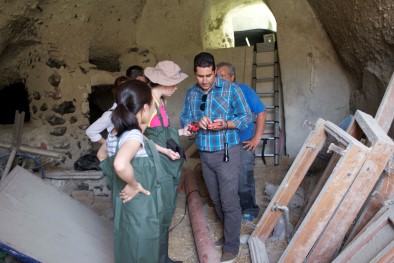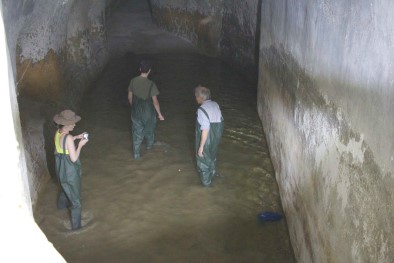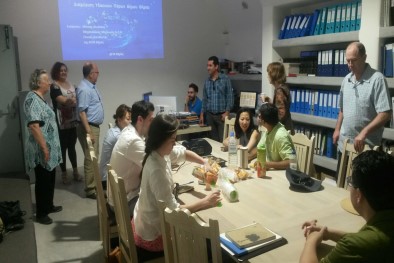Santorini, a global landmark of natural beauty yet with limited fresh water resources, boasts of its water management heritage, with ancient findings from as early as the Cycladic civilisation (ca. 3100-1600 BC). The island has a unique heritage of hand-crafted rainwater harvesting cicterns, constructed by local craftsmen and plastered using Theran soil.

GWP-Med with its deep knowledge and long experience on rainwater harvesting in the Greek islands, designed the project activities and provided detailed guidance to the team of Cornell University, consisting of 6 graduate and post graduate students, selected from diverse backgrounds (Environmental Engineering, Architecture, Urban & Regional Planning, Law studies), in their effort to study traditional rainwater harvesting systems and contribute to the management of water resources on the island.
Working under the supervision of Mr. Gail Holst-Warhaft (Adjunct Professor in the Departments of Classics, Comparative Literature and Near Eastern Studies) and Tammo Steenhuis (Professor in the Department of Biological and Environmental Engineering), the Cornell University team worked towards providing recommendations for more sustainable water use in the island and set as basic goals to:
- promote the use of rainwater harvesting for secondary uses;
- advance the use of other non conventional water resources, such as aquifer recharge with treated waste water;
- raise awareness of locals and tourists on much needed water saving.

The project team worked in the field for three weeks inspecting, documenting and assessing the rehabilitation potential of some handcrafted cicterns in Santorini. Apart from its environmental aspect, the project has a multi-level approach, since it treats water as a cultural element, highlighting the island’s ancient heritage: the development of a virtual Water Museum to be included as the single Greek contribution to the Water Museum of Venice, is expected not only to enhance the cultural tourism of Santorini, but also to mobilize the community through public awareness for water conservation initiatives.
The Rainwater Harvesting Project in Santorini could not be accomplished without the valuable contribution of the Municipality and the Water Supply and Sewage Authority of Thera, who provided technical support and special equipment to enter the selected cisterns, information on current status and challenges of water management of the island, as well as hospitality for the students on the island.
It is envisaged that the project will continue in the coming year, with the support of the Cornell Institute of Mediterranean Studies and GWP-Med, giving an opportuity to more students to engage in hands-on activities to unveil the secrets of rainwater harvesting and share the lessons of sustainable water use from the ancient to current times.
